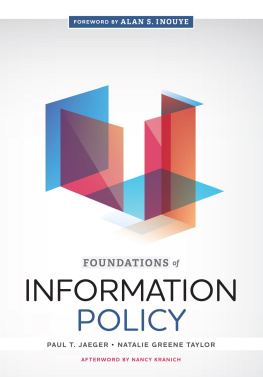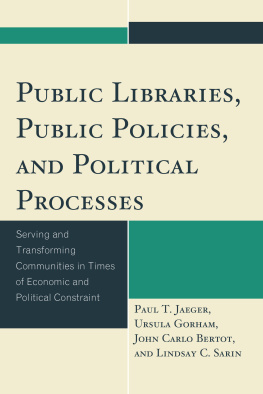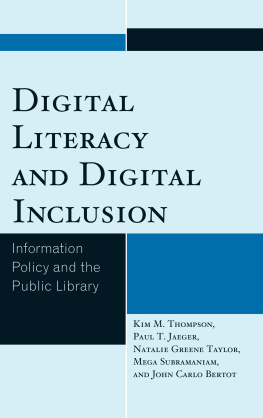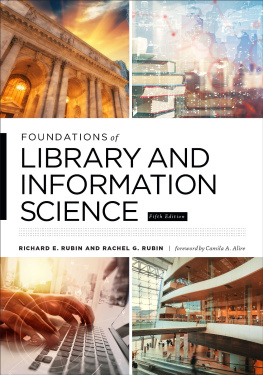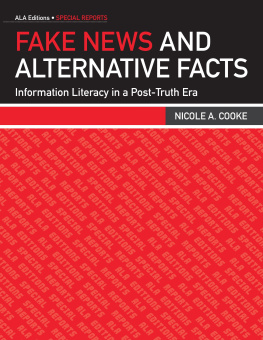Paul T. Jaeger - Foundations of Information Policy
Here you can read online Paul T. Jaeger - Foundations of Information Policy full text of the book (entire story) in english for free. Download pdf and epub, get meaning, cover and reviews about this ebook. year: 2019, publisher: American Library Association, genre: Politics. Description of the work, (preface) as well as reviews are available. Best literature library LitArk.com created for fans of good reading and offers a wide selection of genres:
Romance novel
Science fiction
Adventure
Detective
Science
History
Home and family
Prose
Art
Politics
Computer
Non-fiction
Religion
Business
Children
Humor
Choose a favorite category and find really read worthwhile books. Enjoy immersion in the world of imagination, feel the emotions of the characters or learn something new for yourself, make an fascinating discovery.
- Book:Foundations of Information Policy
- Author:
- Publisher:American Library Association
- Genre:
- Year:2019
- Rating:5 / 5
- Favourites:Add to favourites
- Your mark:
- 100
- 1
- 2
- 3
- 4
- 5
Foundations of Information Policy: summary, description and annotation
We offer to read an annotation, description, summary or preface (depends on what the author of the book "Foundations of Information Policy" wrote himself). If you haven't found the necessary information about the book — write in the comments, we will try to find it.
This book will help future and current information professionals better understand the impacts of information policy on their activities, improving their ability to serve as effective advocates of their institutions, patrons, and communities.
Paul T. Jaeger: author's other books
Who wrote Foundations of Information Policy? Find out the surname, the name of the author of the book and a list of all author's works by series.
Foundations of Information Policy — read online for free the complete book (whole text) full work
Below is the text of the book, divided by pages. System saving the place of the last page read, allows you to conveniently read the book "Foundations of Information Policy" online for free, without having to search again every time where you left off. Put a bookmark, and you can go to the page where you finished reading at any time.
Font size:
Interval:
Bookmark:
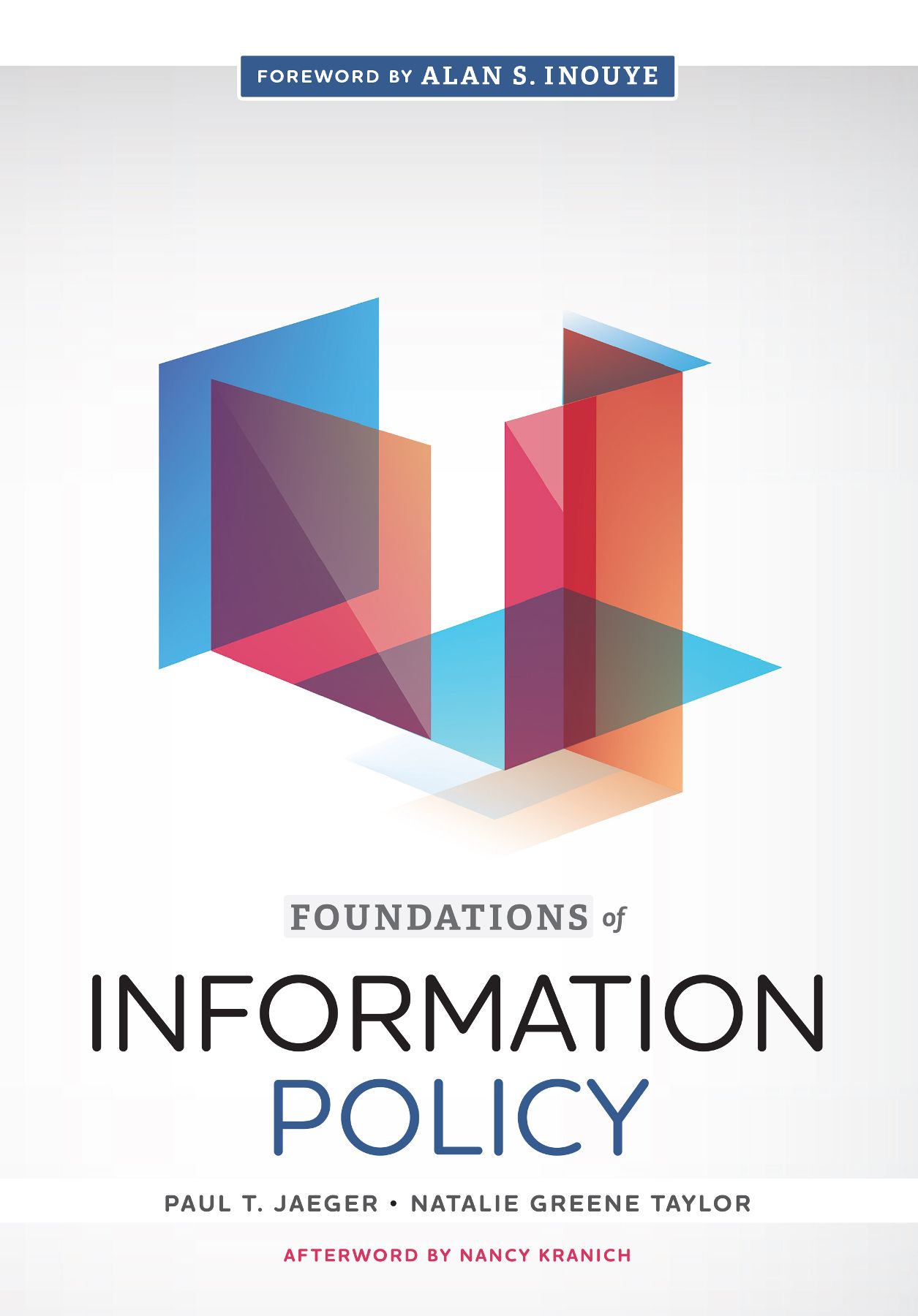
ALA Neal-Schuman purchases fund advocacy, awareness, and accreditation programs for library professionals worldwide.
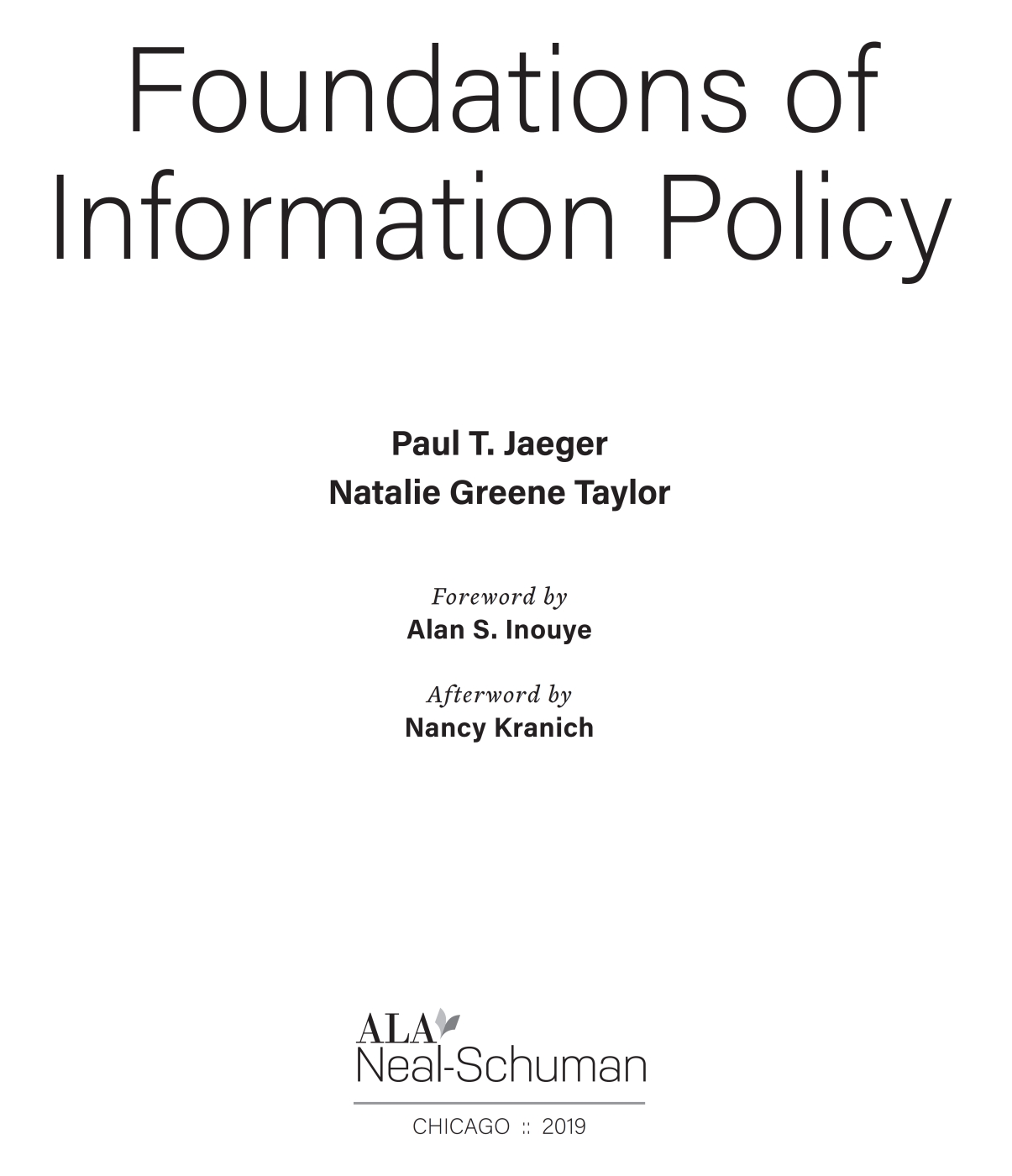
2019 by the American Library Association
Extensive effort has gone into ensuring the reliability of the information in this book; however, the publisher makes no warranty, express or implied, with respect to the material contained herein.
ISBNs
978-0-8389-1802-9 (paper)
978-0-8389-1896-8 (PDF)
978-0-8389-1894-4 (ePub)
978-0-8389-1895-1 (Kindle)
Library of Congress Cataloging-in-Publication Data
Names: Jaeger, Paul T., 1974 author. | Taylor, Natalie Greene, 1987 author.
Title: Foundations of information policy / Paul T. Jaeger and Natalie Greene Taylor ; foreword by Alan Inouye.
Description: Chicago : ALA Neal-Schuman, 2019. | Includes bibliographical references and index.
Identifiers: LCCN 2018059482 | ISBN 9780838918029 (paper : alk. paper) | ISBN 9780838918944 (epub) | ISBN 9780838918968 (pdf) | ISBN 9780838918951 (kindle)
Subjects: LCSH: Information policy.
Classification: LCC ZA3260.J34 2019 | DDC 020dc23
LC record available at https://lccn.loc.gov/2018059482
Cover image marylia17.
This book is dedicated to Abigail Taylor, who was born while the book was being written. On the Fourth of July, no less.
Welcome.
The world is a pretty good place, even if the policies can be a bit confusing.
A bove all else, we are grateful to Rachel Chance at ALA Editions for giving us the opportunity to write this book. For many years, the glaring need for a book that introduces the concepts of information policy to library and information science students, current information professionals, and others interested in these topics has been evident, but Rachels suggestion that we could try writing it was the impetus that previously was missing. So, we tried. We hope the resulting book justifies her faith in us. The books copyeditor, Carolyn Crabtree, also deserves our heartfelt thanks for helping us to convey the ideas presented in the book in a clear, consistent, and orderly fashion.
We would like to acknowledge three of our long-term collaborators for the large amount of impact that working with them has on the way we think about information policy issues. You will notice all three names frequently in the citations in this book. Ursula Gorham is our coeditor at the journal Library Quarterly and a constant collaborator and a dear friend. When we began to contemplate this project, she was originally going to be our coauthor but had to drop out due to other commitments. We greatly appreciate her thoughts on the structure of the book and the topics that should be covered in the book. John Carlo Bertot is also a frequent collaborator on information policy topics and was a mentor to both of us when we were each PhD students. Not only have his ideas heavily influenced how we look at policy issues but without Johns guidance, neither of us might be studying policy issues at all.
Finally, and sadly, we must mention our recently departed collaborator John Shuler, who, aside from being big-hearted and an enormously creative thinker, probably worried more about ensuring access to government information than anybody else. With his unexpected passing in 2016 at way too young an age, one of the most important voices in information policy was silenced. As John would frequently remind us, save the cheerleader, save the world is a pretty good metaphor for thinking about policy. We still havent figured out how, but were working on it.
We have workedindividually and collaborativelywith many other folks as well through the years on information policy projects. These collaborators have worked with us on a wide range of information policy issues and encompass an equally wide range of areas of expertise and professions. They include Bradley Bishop, Gary Burnett, Stephanie Cork, Keren Dali, Elizabeth DeCoster, Courtney Douglass, Beth Douthirt-Cohen, Stefanie Ebrahimoff, Kenneth Fleischmann, Jennifer Golbeck, Justin Grimes, Loni Hagen, Derek Hansen, Renee Hill, Kelly Hoffman, Shannon Jette, Gagan Jindal, Sarah Katz, Hernisa Kacorri, Karen Kettnich, Christie Kodama, Jessica Koepfler, Lesley Langa, Elizabeth Larson, Chris Law, Jonathan Lazar, Jimmy Lin, Ruth Lincoln, Lauren Mandel, Erissa Mann, Christopher Mascaro, Miriam Matteson, Charles McClure, Kathleen de la Pea McCook, Abigail McDermott, Jessica McGilvray, Elspith McKay, Rebecca Oxley, Scott Paquette, Johnna Percell, Natalie Perkins, Kaitlin Peterson, Brian Real, Sophie Reverdy, Miranda Rodriguez, Lindsay Sarin, Jeffery Seifert, Katie Shilton, Kate Sigler, Shannon Simmons, John Snead, Beth St. Jean, Amanda Strausser, Mega Subramaniam, Kim Thompson, Emily Wahl, Amanda Waugh, Brian Wentz, Kim White, Susan Wilson, Bo Xie, and Erin Zerhusen. Kelly Hoffman in particular deserves special mention for also giving feedback on some of the specific points in the text that relate to her research on algorithmic literacy. And thats not even a complete list, but it gives a sense of how important collaboration and a wide range of expertise are in the development of perspectives and the creation of new knowledge in an area as complicated as information policy. Youll also notice many of these names in the citations in this book.
We are also truly grateful to Alan Inouye, director of public policy for the American Library Association, and Nancy Kranich, a faculty member at Rutgers University and former president of the American Library Association, for kindly agreeing to share their wisdom and insights in the foreword and the afterword to this book. You will see the ways in which their wealth of experience conveys how very real and important the topics discussed in this book are to the professional life of our field and institutions. Carol Jaeger, mother of one of the authors of the book (you can probably guess which one), copyedited and commented on the entire book and deserves much thanks for helping to make it readable. Brian Taylor, husband of one of the authors (again, you can probably guess which one), provided necessary feedback on our attempts at humor, and Abby Taylor, said authors daughter, is probably the most knowledgeable four-month-old around on information policy due to her (mostly) patient listens to the book read aloud (were considering the board book version as our next project). And, lastly but not at all leastly, a thank-you to Jennifer Cotton of the University of Maryland Libraries for the suggestions related to wombats and goats in the (it will make sense as you read on) and for pointing us toward the Terry Pratchett quotes about the magical power of libraries.
AASL American Association of School Librarians
ACA Affordable Care Act (Obamacare)
ACLU American Civil Liberties Union
ADA Americans with Disabilities Act
AI artificial intelligence
ALA American Library Association
APA Administrative Procedure Act
ARRA American Recovery and Reinvestment Act
ASL Anti-Saloon League
AT&T American Telephone and Telegraph
CCCE Citizens Councils for Constructive Economy
CD compact disc
CDA Communications Decency Act
CFR Code of Federal Regulations
CIA Central Intelligence Agency
CIPA Childrens Internet Protection Act
COPPA Childrens Online Privacy Protection Act
CPB Corporation for Public Broadcasting
CRS Congressional Research Service
Next pageFont size:
Interval:
Bookmark:
Similar books «Foundations of Information Policy»
Look at similar books to Foundations of Information Policy. We have selected literature similar in name and meaning in the hope of providing readers with more options to find new, interesting, not yet read works.
Discussion, reviews of the book Foundations of Information Policy and just readers' own opinions. Leave your comments, write what you think about the work, its meaning or the main characters. Specify what exactly you liked and what you didn't like, and why you think so.

